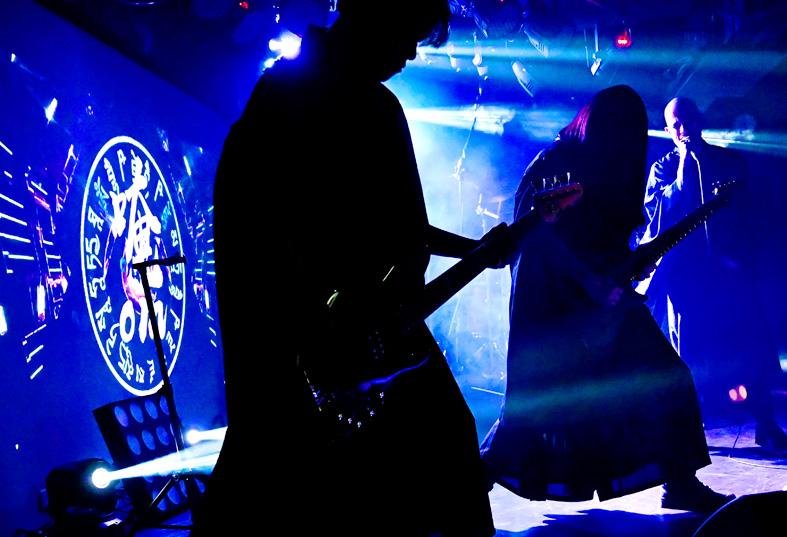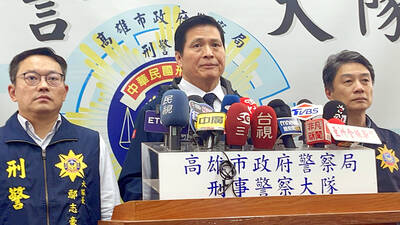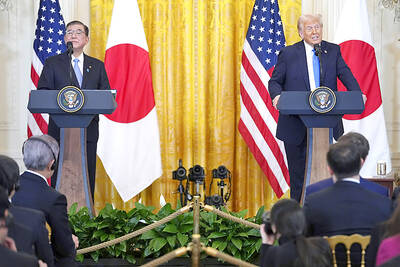The gig began with a nun chanting on stage, but suddenly erupted into a wall of noise unleashed by distorted guitars and screamed sutras — the unique sound of Taiwan’s first Buddhist death metal band.
The nation has a vibrant metal scene, but few outfits are quite as eye-catching as Dharma (達摩樂隊), a band that aims to deliver enlightenment via the medium of throaty eight-string guitars and guttural roars.
Dressed in robes — black, of course — they use traditional Sanskrit sutras as lyrics, but everything else screams death metal, from bloody face paint on stage to growled vocals, relentless riffs and double-kick blast beats.

Photo: Sam Yeh, AFP
Founder and drummer Jack Tung first came up with the idea 14 years ago after listening to a recording of Tibetan lamas reciting sutras.
“The way it’s sung is like in metal, with some voice distortion,” he said, referencing the often throaty low nature of Tibetan chanting. “This is very similar to death metal music, which I like.”
On the face of it, death metal and Buddhism might not appear to be the most natural of bedfellows.
Early death metal bands — and to a more significant extent their black metal cousins — often reveled in Satanic and occult themes. While many were simply trying to shock, some bands — especially out of Scandinavia — were committed Satanists or vehemently anti-religion.
However, like any genre, the scene evolved to welcome a vast array of views and philosophies.
Miao-ben (妙本), the Buddhist nun who opened a Dharma gig in Taipei with traditional chanting, said that she has no issue taking the stage alongside such music.
“Buddhism is not set in form. Having Buddha in our hearts is more important,” she said, adding that unlike more dogmatic faiths, Buddhism is syncretic.
“This is just another form of Buddhist sutra ceremony,” she said of the set list.
Bringing Dharma together was not easy.
“I asked many people and nobody wanted to be in a ‘religious’ choir,” practicing-Buddhist Tung said, laughing.
He decided to work on the songs first, primarily with guitarist Andy Lin — who also grew up in a devout family — and find remaining bandmates later.
They sought the advice of Buddhist Master Chan Song, who provided interpretations of the ancient text and rituals.
Among Master Song’s students was Joe Henley, a Canadian who moved to Taiwan 15 years ago and is now the lead singer.
“Buddhism has become a regular part of my life now,” Henley said, explaining his decision to covert. “I want to do this right. I wanted to be respectable.”
The band’s first single Sapta Jina Bhasitam Papa Vinasana Dharani, an incantation about peace and wellness, is being mastered at a Polish studio and is to be released next month.
“We are getting a lot of attention. I guess because we are doing something new,” Henley said. “I am enjoying the ride, enjoying the experience.”
Tung, who declined to give his age, grew up under the Chinese Nationalist Party (KMT) regime when the authorities heavily censored rock and metal music.
As Taiwan transitioned toward democracy in the 1980s and 1990s, Tung devoured whatever he could find. Bands like Guns N’ Roses and Cinderella introduced him to rock, while pioneers such as Sepultura and Napalm Death got him hooked on the more extreme metal music.
Taiwan has since morphed into one of Asia’s most progressive democracies with vibrant artistic communities and subcultures.
Younger generations, especially those in the cities, are less likely to be as religious as their parents.
Tung hopes to change that in whatever way he can via music.
“We have democracy and lots of freedom and we live in a very open society,” he said. “But social morality has declined.”
Dharma’s live act is deliberately infused with Buddhist traditions. The sutras are projected on screens, so fans can read them. Their face paint embodies the fierce-looking deities found in many temples that fight evil spirits.
“You can’t defend god by being nice and polite,” Tung said.
Celine Lin, 27, came to Dharma’s gig with a friend and was looking up Buddhist texts on her smartphone during the break.
“The music blew my mind,” she said. “It got me interested in sutras and their meanings.”
That is music to Tung’s ears.

Johanne Liou (劉喬安), a Taiwanese woman who shot to unwanted fame during the Sunflower movement protests in 2014, was arrested in Boston last month amid US President Donald Trump’s crackdown on illegal immigrants, the Criminal Investigation Bureau (CIB) said yesterday. The arrest of Liou was first made public on the official Web site of US Immigration and Customs Enforcement (ICE) on Tuesday. ICE said Liou was apprehended for overstaying her visa. The Boston Field Office’s Enforcement and Removal Operations (ERO) had arrested Liou, a “fugitive, criminal alien wanted for embezzlement, fraud and drug crimes in Taiwan,” ICE said. Liou was taken into custody

ON PAROLE: The 73-year-old suspect has a criminal record of rape committed when he was serving in the military, as well as robbery and theft, police said The Kaohsiung District Court yesterday approved the detention of a 73-year-old man for allegedly murdering three women. The suspect, surnamed Chang (張), was arrested on Wednesday evening in connection with the death of a 71-year-old woman surnamed Chao (趙). The Kaohsiung City Police Department yesterday also unveiled the identities of two other possible victims in the serial killing case, a 75-year-old woman surnamed Huang (黃), the suspect’s sister-in-law, and a 75-year-old woman surnamed Chang (張), who is not related to the suspect. The case came to light when Chao disappeared after taking the suspect back to his residence on Sunday. Police, upon reviewing CCTV

TAIWAN ADVOCATES: The resolution, which called for the recognition of Taiwan as a country and normalized relations, was supported by 22 Republican representatives Two US representatives on Thursday reintroduced a resolution calling for the US to end its “one China” policy, resume formal diplomatic ties with Taiwan and negotiate a bilateral Taiwan-US free trade agreement. Republican US representatives Tom Tiffany of Wisconsin’s 7th Congressional District and Scott Perry of Pennsylvania’s 10th District were backed by 22 Republican members of the US House of Representatives. The two congressmen first introduced the resolution together in 2021. The resolution called on US President Donald Trump to “abandon the antiquated ‘one China’ policy in favor of a policy that recognizes the objective reality that Taiwan is an independent country, not

The US-Japan joint statement released on Friday not mentioning the “one China” policy might be a sign that US President Donald Trump intends to decouple US-China relations from Taiwan, a Taiwanese academic said. Following Trump’s meeting with Japanese Prime Minister Shigeru Ishiba on Friday, the US and Japan issued a joint statement where they reaffirmed the importance of peace and stability in the Taiwan Strait and support for Taiwan’s meaningful participation in international organizations. Trump has not personally brought up the “one China” policy in more than a year, National Taiwan University Department of Political Science Associate Professor Chen Shih-min (陳世民)